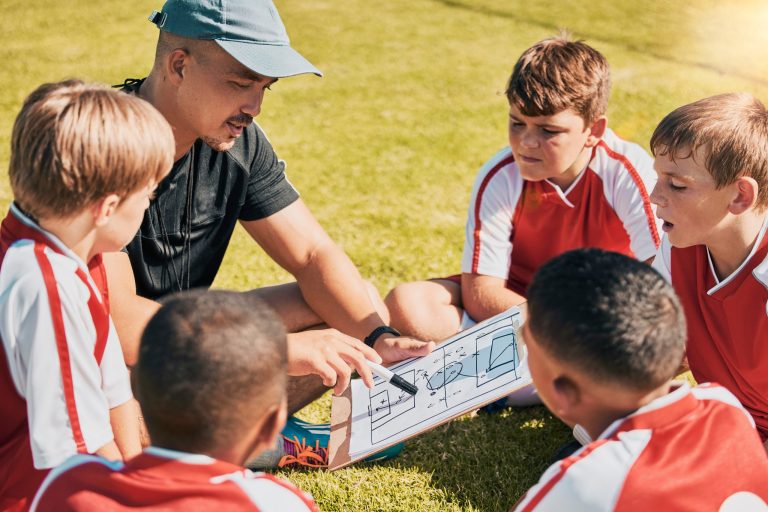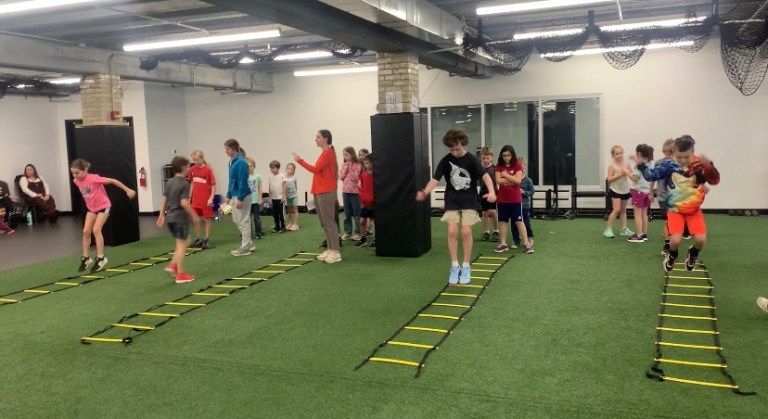Article
How to Destroy Your Child Through Sports
Eight parental behaviors guaranteed to make your kid hate sports—and resent you
Ed Uszynski
redeem youth sports culture
Sign up for resources to help you be a positive force in youth sports culture today.
In spite of mini-movements of outcry regarding poor parent and coach behavior at youth events and the intense pressure being put on kids to perform, many of us seem committed to staying on a course that ruins our children’s ability to enjoy games.
Instead of sports being experienced as something good, a category called “play” that God created for our good and His glory, too often we use our kids’ playground to exorcise our own demons.
So in the spirit of Uncle Screwtape, we offer here a short primer on ruining your child’s ability to enjoy sports, a tongue-in-cheek list guaranteed to create instability in your kids in the context of athletics—and perhaps throughout their life.
In more than 25 years of listening to athletes from youth to professional levels process their experience of sports, I’ve learned that these parental behaviors can be counted on not only to ruin their experience of play, but also to create multi-layered psychological and spiritual maladies that stick throughout life.
For maximum results, apply these tips before, during, and after games.
Note: In the process of destroying their ability to enjoy a setting that should be challenging at times but still almost always fun and pleasurable, we will also be training them to despise our approach to life and to reject other aspects of our worldview outside of sports.
It should be obvious, but continue at your own risk. Here are eight behaviors guaranteed to make your kid eventually hate organized sports—and resent you in the process.
too often we use our kids’ playground to exorcise our own demons.
PURSUE BEING “ELITE”
Travel. Buy individualized training sessions for your 8-year-old. Travel some more.
Avoid playing with actual friends; instead, partner with kids from other communities also tagged as elite.
Pay more money for that 8-year-old travel team than you will for the first year of college. Play in out-of-state tournaments that last four days—every weekend for four months.
Make sure every time your child plays a competitive game she sees flyers and signs that say “select” and “elite” and “showcase” and “premier” and “olympic development” and “Club A-team.”
Bonus: play the lottery. You’ve got a better chance of hitting on a few numbers than your kid eventually playing a college sport, and you’ll need the extra money to pay into the ever-growing racket of the youth sports industrial complex.
USE GUILT AND SHAME
This is an around the clock tactic.
One approach is simply to regularly remind them what it costs you in time and money for them to play, and what a privilege and opportunity they have that you never had.
Better still (and much more destabilizing), you should point out how much better they would be right now if they hadn’t wasted so much time doing other things last summer—or whenever the appropriate off season occurs for the sport you are ruining.
Make sure she knows that her time is running out—especially if she’s not quite a teenager but has obviously wasted her adolescent motor-skill development in countless ways.
Count the ways out loud.
Repeatedly.
Until she feels like she’s wasted all 14 years of her life. Breed the kind of insecurity that has a chance to become an unhealthy drive later in her teen years and into young adulthood.
EMPHASIZE CONSTANT CORRECTION
Aggressively point out fixes and offer correctives for every aspect of the game that either didn’t go well or that you thought should have looked different.
Make sure to repeat the same thing multiple times. Critical parent coaching moments like these need to be reinforced repeatedly until they stick.
Make performance perfectionism the standard. While he has no chance of actually being perfect (see: Jesus), we all know the path to elite athleticism includes maintaining a standard driven and clarified by the idea of perfection.
While 3 for 5 is always a great day at the plate, talk on the way home about “giving two at bats away” and how her approach was completely off.
When he shoots 7 for 10 from the field, talk only about the 3 that missed and how to fix them next time. (Occasionally pointing out that “you may not get a next time” is a nice touch that creates even more of the pressure we think will bring out their best.)
Instead of celebrating even for a moment being chosen as one of five girls out of 15 who were chosen to take the end-of-game penalty kicks, keep explaining how a different approach to the ball would have prevented her from hitting the crossbar.
And don’t miss this opportunity to point out that penalty kicks are “something that should have been worked on in the off-season instead of playing video games” (see #2).
DOWNPLAY THE POSITIVE
Whenever someone pays your son a compliment in front of you, make sure to diffuse its positive potential in his life by pointing out what’s still wrong with some aspect of his game.
Better still, take that compliment and turn it back on itself!
“You’re right. He has gotten a lot stronger in the upper body this year. But he still plays soft.”
“His swing is definitely quicker and smoother, but he still can’t hit stuff on the outside corner.”
“He’s definitely wired to be a leader, he just has no idea where he’s going himself.”
Spin it negatively whenever possible. You can harbor pride in your own heart when others compliment your kid, but if you let seeds of encouragement grow in their young and developing soul, it will inevitably lead to arrogance and laziness.
Snuff the positivity out! Don’t give in to the “participation trophy” mentality that’s taking over our country—you don’t always get to feel good in life. The less you allow him to feel positive about himself or how he relates to others the better. Contentment breeds stagnation.
DEMAND “FINAL PRODUCT” MATURITY
We want to spur growth—constant growth—especially in those areas of life that we never mastered ourselves. In fact, be particularly tough on those traits you see in your son that remind you of yourself.
Expect him—no, force and demand from him—that he function maturely in areas of life that you continue to struggle with as an adult.
If you don’t create pressure to change at 13, he may wind up just like you.
Demand the end result of growth now and leave the process for later!
SILENT TREATMENT
Sometimes it’s better to just not say a word. After all, you are so frustrated with her you know nothing positive will come out of your mouth.
So slay her with your silence! Leave it to her own wild imagination to decide what you are thinking.
Allow her to feel more worthless and guilty about whatever it is she didn’t do right by letting your silence say it all: “I’m so frustrated with your performance right now I can’t even speak.” Combined with silence, an occasional sigh or slow shake of the head make for nice ornamental touches.
This not only encourages her to feel worse, but will also train her to approach other emotional moments in her life with the same instability.
The alternative—completely blowing up on her—can also be useful when contrasted with the silent treatment.
Your own instability regarding her performance will help her feel like she’s constantly got both feet planted firmly in the air.
NEED DISCUSSION QUESTIONS?
Which point did you resonate with the most? Why?
Why do you think we (or our parents) so easily default to these methods?
If these methods continue, how will that (or has that) effect our kids view of God?
What is one step we can make to change in this area? Or one step we can take to heal from a past wound?
ASK RHETORICAL/EXASPERATED QUESTIONS
General: What’s wrong with you? Why would you do that again? How many more times are you going to make that mistake? Why aren’t you doing what you’re being coached to do?
Sport specific: Why would you pass when you’re wide open? Why do you keep missing the hole to run through? Why won’t you swing at the first pitch? Why do you always swing at the first pitch? Why can’t you ever stop the ball at the net? When will you start stopping the ball?
IN-GAME FEEDBACK (EXPRESSED BY CONSTANT YELLING DURING THE GAME)
If the coach won’t do it, somebody has to, right? And we’ve all been in situations where the coach yelled the entire game but had no idea what he was talking about. Play your role!
Let repetition work its magic. If your child hears you yell “GO! RUN! STOP!” enough, at some point you have to figure it will all sink in.
You know you’re getting somewhere when your kid starts yelling stuff back at you from the court or field. You’re almost there! Now you’ve got their attention which is the greatest challenge in this attention-deficit-creating kind of world we live in.
Indeed, until young Erik or Maria or Jack start yelling things back in your direction during the game, you know you’ve got your work cut out for you.
Don’t give up! The more you yell your encouragement, the harder it will be for them to continue ignoring you.
It’s just a matter of time before they despise having you at the games at all, and in these vulnerable conditions you’ll have the kind of lasting impact they’ll never forget.
READ THE LATEST
Where sport culture, relationships, character, identity, and faith collide.


